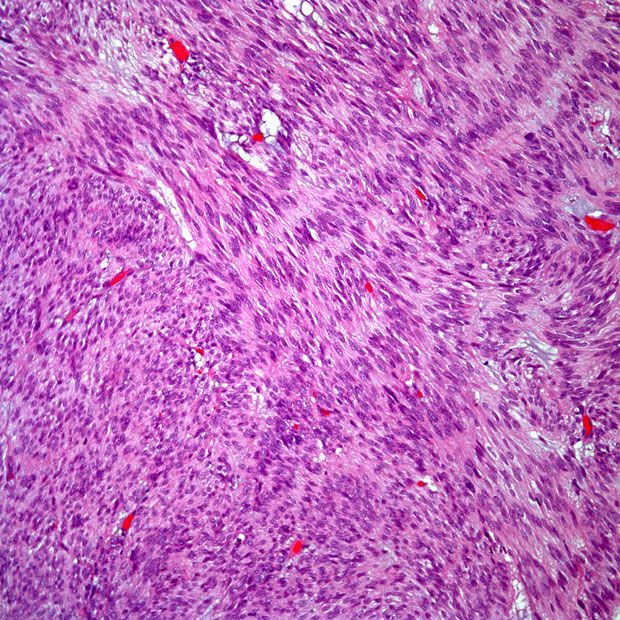Pembrolizumab Combo Improves PFS Vs Placebo in HER2+ Gastric/GEJ Cancer
Combining pembrolizumab with trastuzumab and chemotherapy did not raise any new safety signals among patients with HER2-positive advanced gastric or gastroesophageal adenocarcinoma in the phase 3 KEYNOTE-811 trial.
Pembrolizumab plus trastuzumab and chemotherapy received accelerated approval from the FDA for HER2-positive gastric or GEJ adenocarcinoma in May 2021.

Adding pembrolizumab (Keytruda) to trastuzumab (Herceptin) and chemotherapy produced a statistically significant improvement in progression-free survival (PFS) vs placebo plus trastuzumab and chemotherapy among patients with HER2-positive advanced gastric or gastroesophageal (GEJ) adenocarcinoma, according to a press release on findings from the phase 3 KEYNOTE-811 trial (NCT03615326).1
In the trial, the experimental regimen only demonstrated PFS improvement among patients with PD-L1–positive tumors in the intent-to-treat (ITT) population, who made up over 80% of the study population. Investigators have reviewed these data with the FDA and look to update the current indication for pembrolizumab in HER2-positive gastric or GEJ adenocarcinoma to include patients with PD-L1–positive disease.
Additionally, investigators plan to share these findings at a future medial meeting and share their results with regulatory authorities across the world.
In the ITT population, investigators also highlighted a trend toward improved overall survival (OS) with the pembrolizumab-based regimen, although these data did not reach statistical significance. Further evaluation of OS will take place in a subsequent analysis. Moreover, the safety profile of pembrolizumab in the KEYNOTE-811 trial was comparable with previous reports of the agent.
“We look forward to sharing these results with the medical community and regulatory authorities to ensure this [pembrolizumab]-based regimen is available to appropriate patients, and we are working with the FDA to update the current indication for [pembrolizumab] to those patients whose tumors are PD-L1 positive,” Scot Ebbinghaus, MD, vice president of global clinical development at Merck Research Laboratories, said in the press release.
In the randomized, double-blind KEYNOTE-811 trial, 732 patients with locally advanced unresectable or metastatic HER2-positive gastric or GEJ adenocarcinoma were randomly assigned to one of 2 treatment arms. Patients either received 200 mg of pembrolizumab or matched placebo every 3 weeks plus trastuzumab and fluoropyrimidine- and platinum-containing chemotherapy.
The dual primary end points of the trial were PFS per RECIST v1.1 criteria and OS. Secondary end points included objective response rate (ORR), duration of response, and safety.
Patients 18 years and older with HER2-positive disease as assessed by central review on the primary or metastatic tumor and measurable disease per RECIST v1.1 criteria were eligible for enrollment on the trial. Additional eligibility criteria included having an ECOG performance status of 0 or 1, a life expectancy of greater than 6 months, and adequate organ function.
The pembrolizumab-based regimen received accelerated approval from the FDA for HER2-positive gastric or GEJ adenocarcinoma in May 2021.2 The regulatory agency based its approval on findings from the KEYNOTE-811 trial. According to data shared at the time of the approval, the ORR was 74% (95% CI, 66%-82%) in the pembrolizumab arm vs 52% (95% CI, 43%-61%) in the placebo arm (P <.0001).
“We are pleased to bring a new first-line combination regimen with [pembrolizumab] that has shown meaningful improvement in ORR over standard treatment to patients with HER2-positive gastric and GEJ cancer,” Roy Baynes, MD, PhD, chief medical officer at Eikon Therapeutics, Inc., said in a press release at the time of the accelerated approval.
References
- KEYTRUDA® (pembrolizumab) plus trastuzumab and chemotherapy met primary endpoint of progression-free survival as first-line treatment in patients With HER2-positive advanced gastric or gastroesophageal junction (GEJ) adenocarcinoma. News release. Merck. News release. June 16, 2023. Accessed June 16, 2023. bit.ly/3p903iB
- FDA Approves Merck’s KEYTRUDA (pembrolizumab) combined with trastuzumab and chemotherapy as first-line treatment in locally advanced unresectable or metastatic HER2-positive gastric or gastroesophageal junction adenocarcinoma. News release. Merck. May 5, 2021. Accessed June 16, 2023. https://bit.ly/2SjmdOj